
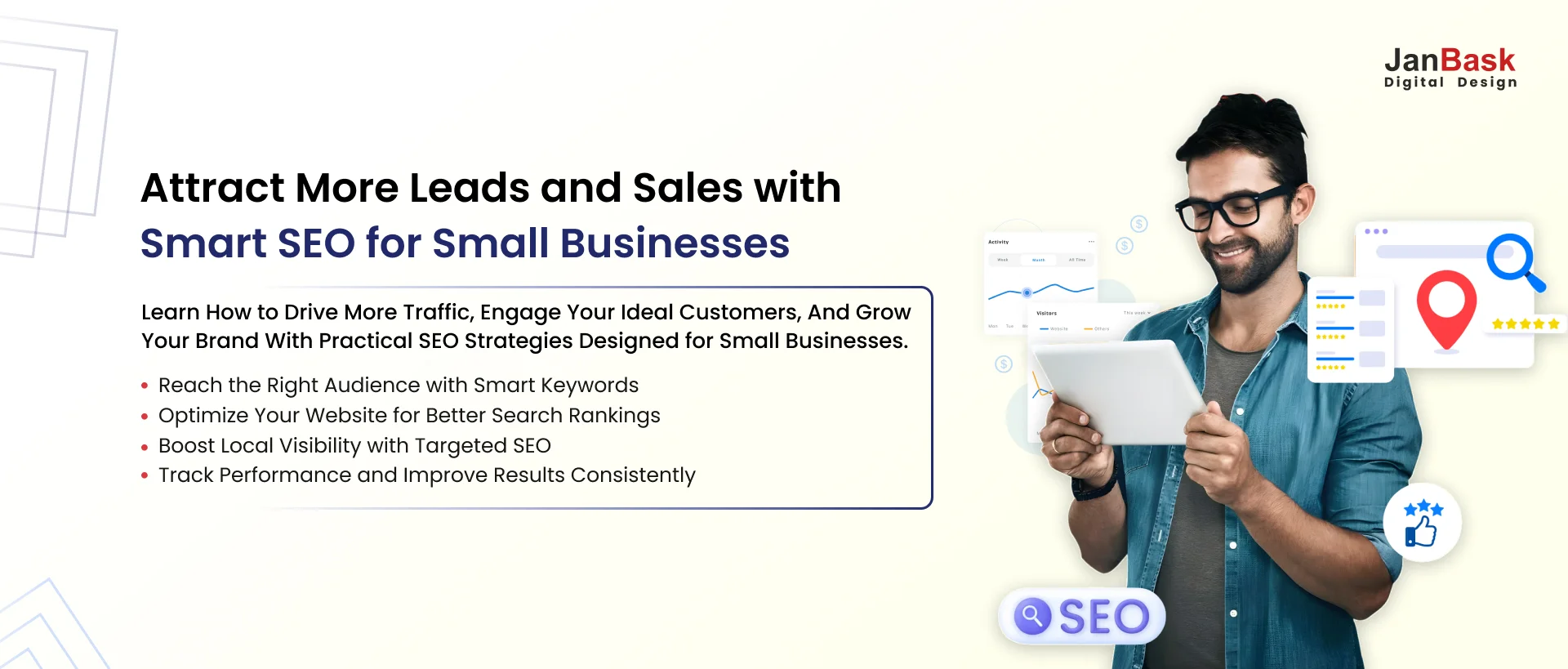
Every small business has the potential to shine online, but that visibility doesn’t happen by chance. SEO for small businesses turns your website into a magnet for the right audience, helping you reach customers who are actively searching for what you offer. With a strong SEO strategy, even a modest website can create a big impact, driving leads, sales, and long-term growth.
The numbers speak for themselves. Businesses that invest in business search engine optimization often see a sharp rise in web traffic, stronger brand recognition, and better conversion rates. Small business SEO isn’t just about rankings—it’s about connecting with the people who matter most to your business and building a digital presence that delivers results every day.
Yet, many small business owners hesitate because of myths and misconceptions. Some think SEO is too technical, too expensive, or only useful for big companies. The truth is, SEO for small business websites is practical, achievable, and incredibly rewarding. With the right SEO tips, even small teams can make a significant online impact without breaking the budget.
For small businesses, competing with big brands can feel like an uphill battle. Larger companies often dominate the market with nationwide reach, massive advertising budgets, and well-established reputations. But this is exactly where SEO for small businesses becomes a powerful equalizer. Unlike big corporations that can afford to run constant paid ads, small businesses usually work with limited marketing budgets and less brand recognition. That’s why investing in SEO marketing for small businesses is not just beneficial but essential for growth.
By focusing on a smart and well-structured small business SEO strategy, you can build sustainable visibility, attract high-intent customers, and strengthen your online presence over time. Instead of relying solely on costly short-term campaigns, SEO gives you the opportunity to rank in search results, build trust with your audience, and consistently generate organic traffic. It’s the most effective way for small businesses to level the digital playing field, reach the right audience, and win attention—even against much larger competitors. Here’s how SEO gives small businesses a real edge:
In other words, SEO helps small businesses punch above their weight, gaining visibility, trust, and customers without needing the massive resources of big brands.
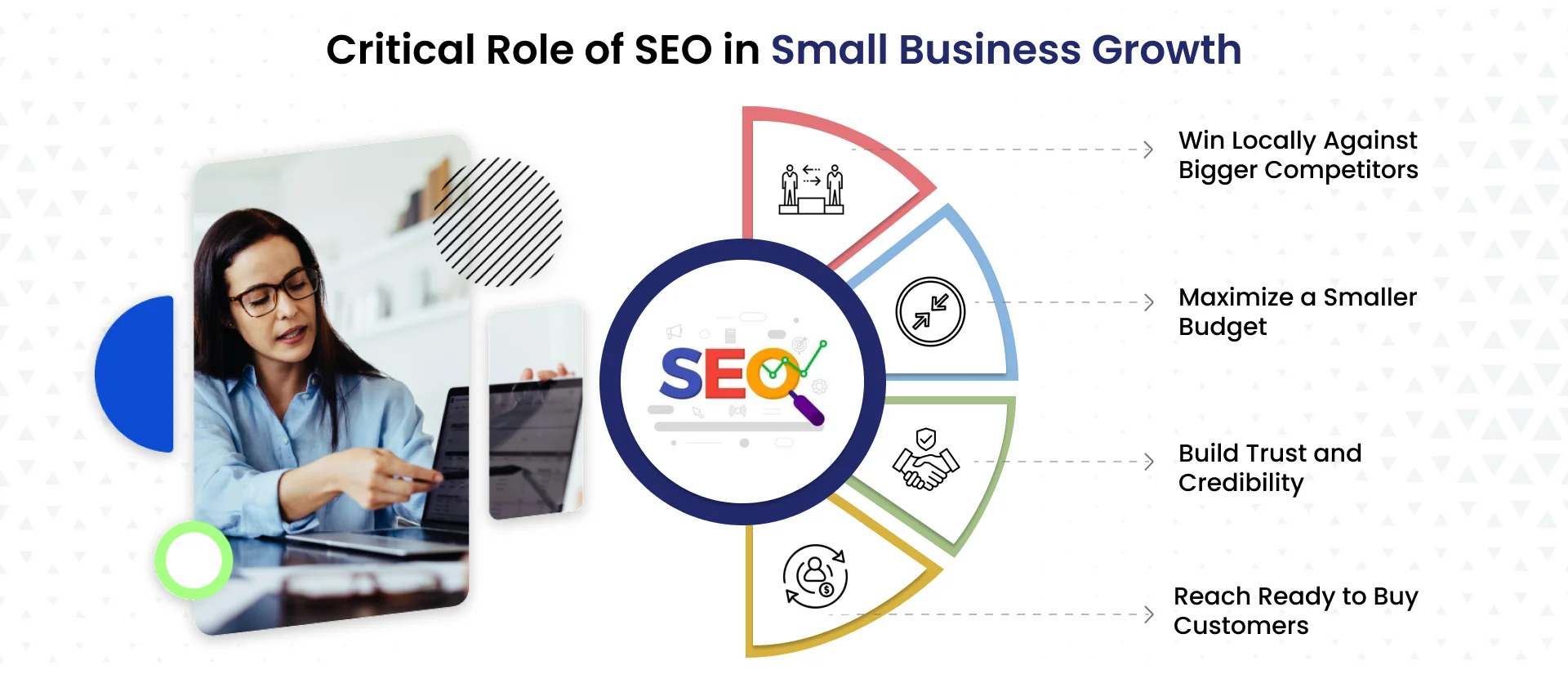
Before launching any small business SEO strategy, it’s essential to understand your current SEO performance. Reviewing where your website stands highlights what’s working, what needs improvement, and where opportunities exist. Using tools like Google Analytics and Search Console helps you track keyword rankings, traffic trends, and user behavior—giving you the insights needed for effective business search engine optimization.
Next, focus on setting clear goals and analyzing your competition. Whether your objective is to increase organic traffic, generate more leads, or strengthen online visibility, realistic milestones make progress measurable and achievable. Competitor benchmarking also reveals which SEO strategies for small businesses deliver results, helping you create a smarter, customized SEO plan that positions your website ahead of the competition.

The right approach can turn your website into a powerful engine for attracting customers. The following SEO strategies for small businesses are practical, actionable, and designed to deliver measurable results. Each tactic focuses on boosting traffic, connecting with the right audience, and strengthening your business's search engine optimization for long-term success.
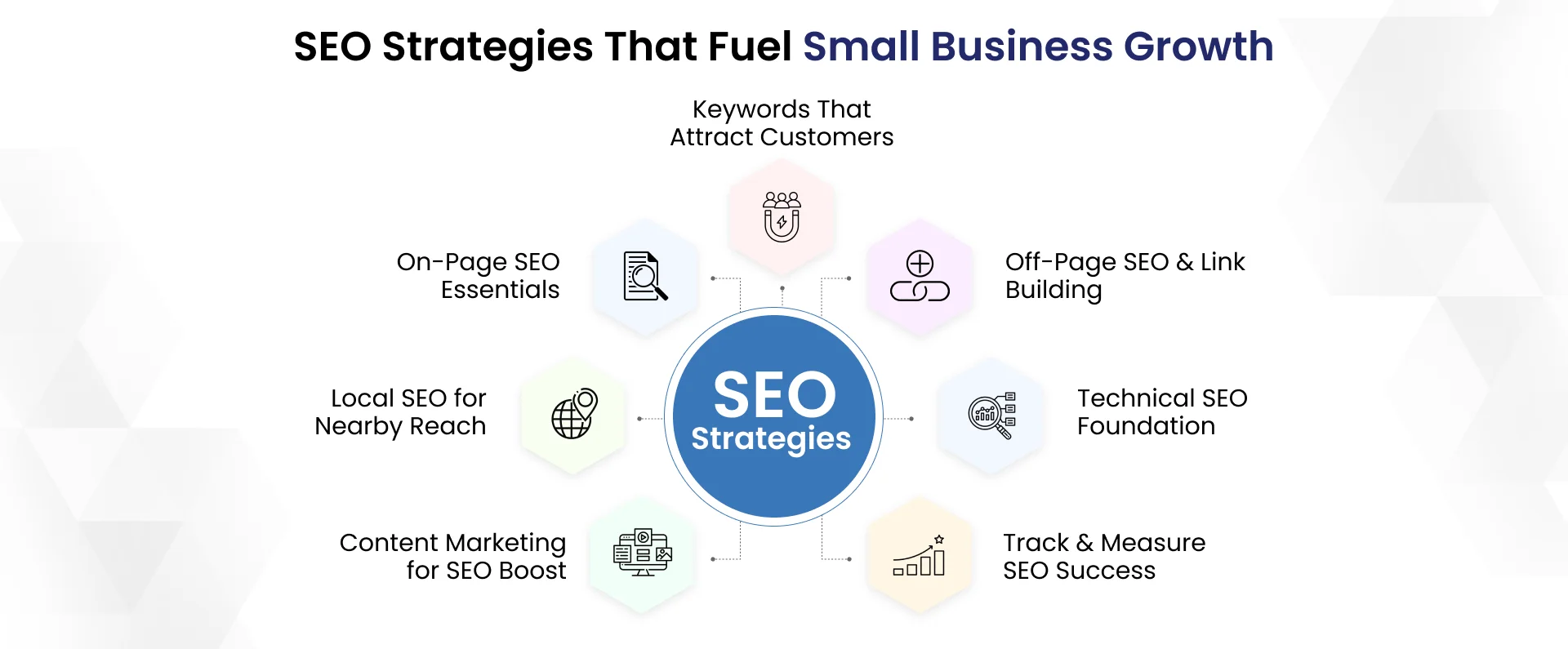
A strong keyword approach forms the heart of any effective small business SEO strategy. Targeting the right keywords helps your website connect with people actively looking for your products or services. By balancing specificity and reach, your SEO can attract the right audience while increasing overall visibility. Here are the key steps to a winning keyword strategy:

Long-tail keywords capture highly specific searches, often leading to higher conversion rates, while short-tail terms help maintain broader visibility and brand awareness, and together they create a balanced strategy that attracts both niche and broad audiences.
AI-powered platforms and modern SEO tools provide actionable insights, including trending keywords and competitor analysis, helping you refine your business search engine optimization efficiently while also saving time and giving your SEO efforts a competitive edge.
Classify keywords based on informational, transactional, and navigational intent to ensure your content meets what users are actively seeking, increasing engagement and conversions by targeting them at every stage of the customer journey.
Every keyword should align with your audience’s needs and your business goals, strengthening your overall small business SEO plan and driving meaningful traffic while also building trust and encouraging visitors to return.
Optimizing your website’s pages is crucial for making your small business SEO strategy effective. Proper On-Page SEO ensures search engines understand your content and helps visitors navigate your site easily. From meta tags to mobile performance, every element contributes to better rankings and a smoother user experience. Here are the key On-Page SEO practices:

Craft descriptive meta titles and headings while using image alt text to improve relevance, visibility, and accessibility for both users and search engines, ensuring your content consistently stands out in search results and drives higher click-through rates.
Connect related pages within your website to boost page authority, help search engines crawl your site efficiently, and guide visitors to valuable content, creating a smoother navigation path that improves overall engagement and encourages deeper site exploration.
Ensure your website loads quickly, responds seamlessly on all devices, and delivers a smooth user experience, which is critical for SEO for small business websites and keeps visitors from bouncing away too soon, while also meeting Google’s ranking standards.
Use clear formatting, bullet points, and concise paragraphs to make your content engaging for visitors while signaling quality to search engines, ultimately increasing the chances of users staying longer on your site and returning for future visits.
For small businesses, reaching local customers can be a game-changer. Small business SEO that focuses on local search ensures your business appears in front of people who are ready to buy nearby. From Google listings to location-specific content, local SEO connects your business directly with your target audience. Here are the key local SEO tactics:

Complete all sections, add accurate contact information, and regularly update images to make your business more visible in local searches. Consistently posting updates, offers, or events can further boost engagement and help your profile stand out from competitors.
List your business on trusted directories and encourage satisfied customers to leave reviews, boosting credibility and trust in local search results. Keeping your business details consistent across all platforms also strengthens your local SEO efforts.
Develop content and landing pages specific to neighborhoods, cities, or regions to increase relevance and attract nearby customers searching for your services. Adding customer testimonials or case studies tied to each location can further build trust and authority.
Respond to reviews, participate in local forums, and share local news or events to strengthen your local presence and authority. By highlighting your involvement in community initiatives, you can show authenticity and connect with customers on a deeper level.
Content is the bridge between your business and your audience. Effective SEO for small businesses goes beyond keywords—it’s about creating valuable, engaging content that attracts, informs, and converts visitors. A strong content strategy not only improves your search rankings but also builds trust and authority for your brand. Here are the key content marketing tactics:
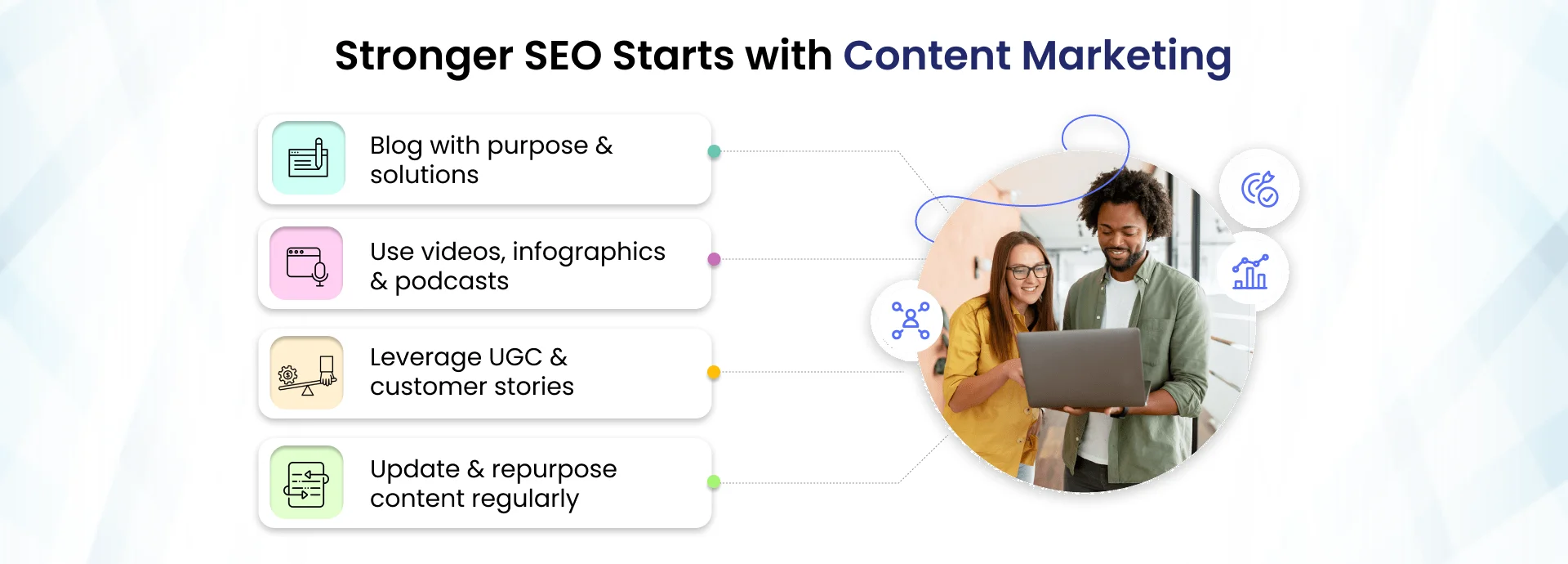
Focus on topics that answer customer questions, provide solutions, and align with your small business SEO strategy to attract meaningful traffic. Consistently publishing problem-solving blogs also positions your brand as an industry resource and builds long-term trust.
Multimedia content increases engagement, keeps visitors on your site longer, and signals value to search engines, enhancing your business search engine optimization. These formats also make complex information easier to understand and highly shareable across social platforms.
Testimonials, reviews, and real customer experiences create authentic content that boosts credibility and encourages conversions. Featuring these stories prominently across your site and social channels adds social proof that strengthens brand reputation.
Refresh older posts, optimize them for new keywords, and repurpose content across formats to maintain relevance and visibility. This approach ensures your content library keeps delivering results without always needing to create from scratch.
Off-Page SEO is all about building your website’s authority and credibility in the eyes of search engines. For small business SEO, creating a strong external presence can boost rankings, drive referral traffic, and strengthen your overall business search engine optimization. Here are the key Off-Page SEO strategies:

Focus on earning links from reputable websites within your industry, as these signal trust and authority to search engines, improving your site’s ranking. High-quality backlinks also drive referral traffic and strengthen your brand’s visibility online.
Sharing content on social platforms can increase visibility, attract organic links, and drive more traffic, supporting your SEO for small business websites. Consistent engagement across platforms also helps build brand recognition and customer loyalty.
Work with complementary businesses or industry influencers to generate backlinks, expand your audience, and build credibility. Such collaborations can also open doors to cross-promotions, events, and co-branded campaigns for wider reach.
Contributing valuable content to relevant blogs and forums enhances your authority, creates natural backlinks, and strengthens your SEO presence. Active participation also positions your business as a thought leader within your niche.
A strong website structure is crucial for an effective small business SEO strategy. Technical SEO ensures search engines can easily crawl, index, and understand your site, while also providing a smooth experience for visitors. Optimizing these elements lays the groundwork for higher rankings and long-term growth. Here are the key technical SEO practices:

Fast-loading pages and a secure website not only improve user experience but also boost rankings, making your SEO for small business websites more effective. Investing in reliable hosting, image compression, and HTTPS ensures long-term trust and performance.
Help search engines understand your content better, enabling rich snippets that increase visibility and click-through rates. Schema markup also enhances your listings with star ratings, FAQs, and other elements that attract more clicks.
Maintain clean sitemaps, fix broken links, and optimize robots.txt to ensure all valuable pages are discoverable by search engines. Regular monitoring prevents crawl errors and keeps your site fully accessible for both bots and users.
Periodic technical checks help identify issues before they impact your business search engine optimization, keeping your site healthy and competitive. A proactive audit schedule ensures that your site adapts to algorithm updates and new SEO best practices.
You can’t improve what you don’t measure. Monitoring your small business SEO strategy ensures your efforts are driving real results and helps you make informed decisions. By tracking the right metrics, you can see what’s working, identify opportunities, and continuously refine your SEO. Here are the key steps to measure SEO success:
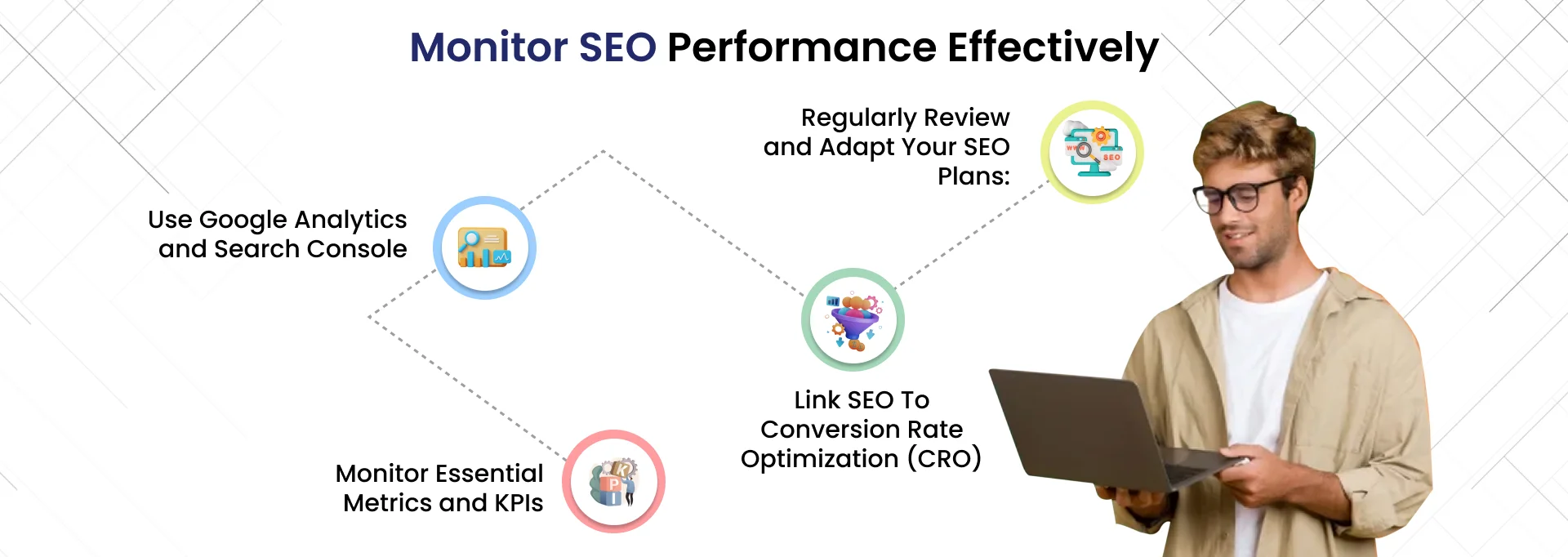
Track organic traffic, keyword rankings, bounce rate, and lead generation to evaluate the performance of your business's search engine optimization efforts. Consistently monitoring these numbers helps identify strengths, gaps, and areas that need immediate improvement.
These tools provide detailed insights into visitor behavior, keyword performance, and technical issues, helping you optimize your SEO strategy efficiently. Leveraging their data ensures you make informed decisions backed by measurable evidence.
Measure how SEO-driven traffic converts into leads or sales, and adjust content, CTAs, and landing pages to maximize ROI. Integrating CRO with SEO ensures your efforts go beyond rankings and directly impact revenue.
Consistent monitoring allows you to spot trends, learn from successes, and refine your small business SEO plan for long-term growth. Adapting quickly to algorithm updates and user behavior shifts keeps your strategy resilient.
Even the best small business SEO strategy can fall short if common mistakes are ignored. From poor keyword targeting to neglecting mobile optimization, these errors can prevent your website from ranking higher in search results. Recognizing these issues early not only protects your visibility but also ensures your SEO for small business websites is driving real results.
By avoiding these pitfalls, you safeguard your rankings, strengthen credibility, and make every part of your SEO marketing more impactful. Whether it’s overlooking technical SEO, failing to create valuable content, or ignoring local SEO opportunities, steering clear of these missteps keeps your small business SEO strategy on track for long-term growth. Here are the most common mistakes to watch out for:

A well-executed small business SEO strategy can turn your website into a powerful growth engine, attracting the right audience and driving meaningful results. From keyword research and on-page optimization to local SEO and content marketing, each step builds a stronger foundation for your business’s online success.
At JanBask, we believe every small business has the potential to stand out in search results. The sooner you start implementing SEO for small business websites, the faster you can reach new customers, generate leads, and grow your brand. Take charge of your SEO journey today and make your business visible where it matters most.
Remember, SEO is not just a marketing tactic; it’s an investment in your business’s future. With consistent effort and the right strategies, your website can become a reliable source of leads, credibility, and growth. JanBask Digital Design is here to guide you every step of the way, helping you implement effective SEO for small business websites that deliver lasting results and keep you ahead of the competition.
Discover Proven SEO Strategies for Small Business Growth!

E
Thanks for sharing the checklist. It is very useful.
K
How to set up a Google My Business Page? Can you please share more information about it?
J
Thanks for your feedback! You can contact https://www.janbaskdigitaldesign.com/contact-us for your queries.
A
Very good blog!
A
Mobile responsive websites definitely play a significant role in getting better user results.
K
How often should the SEO keyword analysis be done on a website?
J
These tips are handy; any small business can get sure results if appropriately implemented. Do you think small businesses should approach any digital marketing or SEO agency for this or practice it independently?
J
Thanks for reading our blog Jitin, for queries kindly contact info@janbaskdigitaldesign.com
E
This is a great blog emphasizing on the top 13 small business SEO strategies that will enhance the ranking on search engine result page. Every budding businessman dreams of their website being ranked on top of the search page. This is a great blog detailing all the possible way out apart from highlighting the importance of SEO strategies for small businesses.